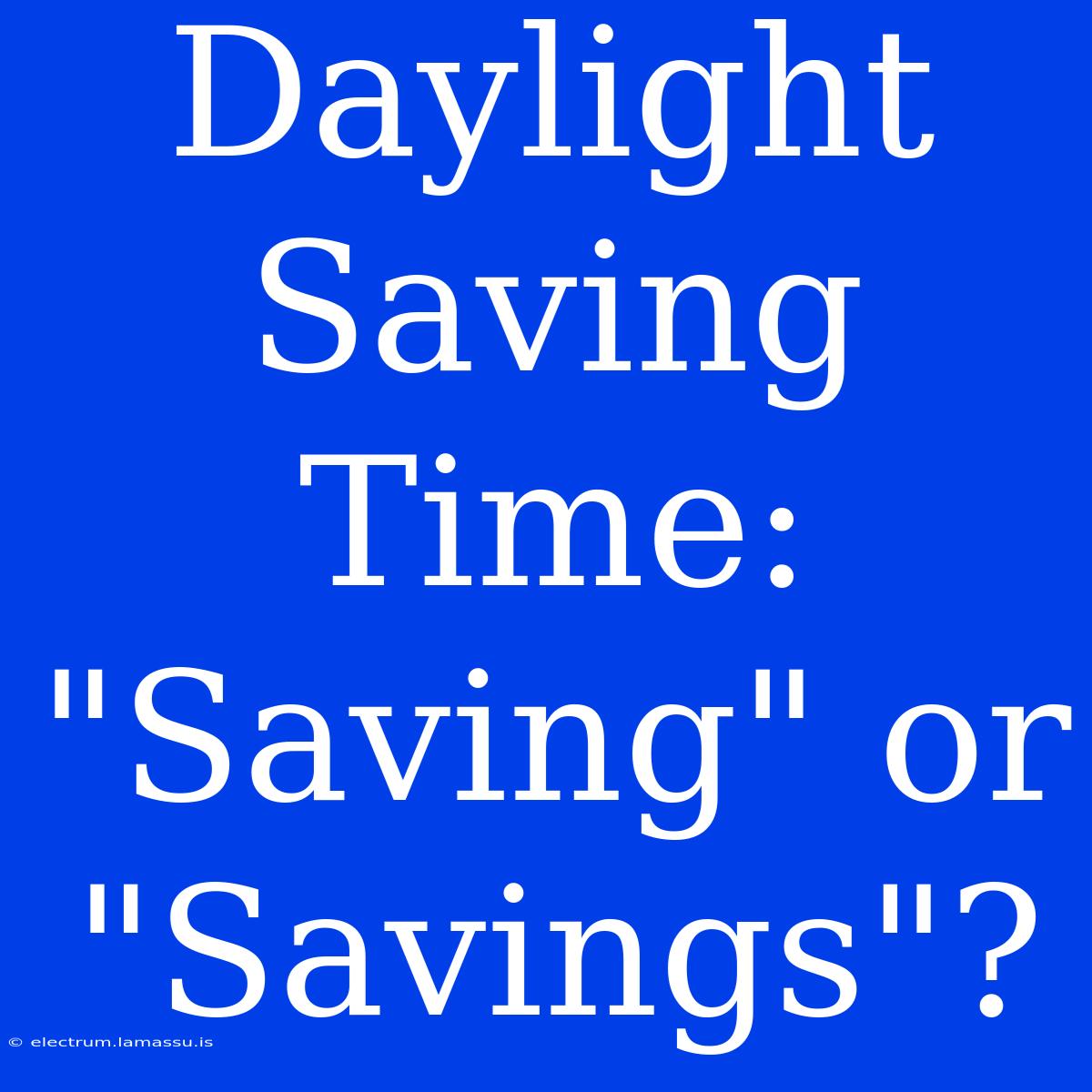Daylight Saving Time: "Saving" or "Savings"? Unlocking the Secrets of a Time-Honored Debate
Do we "save" or "savings" when it comes to Daylight Saving Time? This seemingly simple question has sparked a debate that stretches back decades, causing confusion and sparking heated arguments. Let's delve into the intricacies of this linguistic puzzle and explore the truth behind Daylight Saving Time.
Editor Note: The debate about the proper use of "saving" or "savings" in the context of Daylight Saving Time has reignited with the recent shift back to standard time. This is an important topic as it highlights the subtle nuances of language and the power it holds to shape our understanding of the world.
Why does this topic matter? Understanding the correct usage of "saving" or "savings" in this context is vital for clear communication and effective writing. It helps avoid unnecessary ambiguity and ensures that our messages are conveyed accurately.
Our analysis: We have researched dictionaries, grammar guides, and style manuals to provide a comprehensive understanding of this linguistic dilemma. This guide aims to clarify the appropriate usage of "saving" or "savings" in relation to Daylight Saving Time, providing insightful analysis and practical tips for your writing.
Key Takeaways of Daylight Saving Time:
| Concept | Description |
|---|---|
| Purpose | To shift the clock forward one hour during the summer months, maximizing daylight hours and potentially saving energy. |
| History | Originated in the early 20th century to conserve energy during wartime. |
| Controversy | Debates regarding its effectiveness, impact on health, and potential economic implications. |
| Terminology | The correct term is "daylight saving time," not "daylight savings time." The word "saving" is used as an adjective, not a noun. |
Let's dive deeper into the debate.
Daylight Saving Time: "Saving" or "Savings"?
The correct usage is "daylight saving time," with the word "saving" acting as an adjective. This indicates that the time is being saved, not referring to accumulated savings.
- The "saving" in "daylight saving time" is an adjective, not a noun. It describes the type of time, which is a time that is being saved.
- The term "savings" refers to a collection of money or resources set aside. This usage does not apply to daylight saving time.
The Linguistic Nuances of Daylight Saving Time
Understanding the grammatical function of "saving" in this context is crucial for accurate usage.
- "Saving" modifies "time" and describes its purpose. The phrase "daylight saving time" signifies that the clock is being adjusted to save daylight hours.
- The term "savings" is a noun, suggesting an accumulated amount of something. It does not relate to the concept of adjusting the clock to extend daylight.
By clarifying the grammatical function of "saving" in "daylight saving time," we can communicate effectively and avoid common linguistic errors.
FAQ: Daylight Saving Time
Q: Why do people often get confused about the proper usage of "saving" or "savings"?
A: The confusion stems from the common usage of "savings" to refer to financial savings. This often leads to people associating "saving" with a noun rather than an adjective.
Q: Is it acceptable to say "daylight savings time" even if it's technically incorrect?
A: While the term "daylight savings time" has become widely used, it is considered grammatically incorrect. It is best to stick to the correct usage, "daylight saving time," for clearer communication.
Q: Why is Daylight Saving Time so controversial?
A: Daylight Saving Time has faced opposition due to its perceived impact on health, energy consumption, and the potential disruption to daily routines.
Q: What are the potential benefits of Daylight Saving Time?
A: Proponents argue that it can save energy, reduce crime rates, and boost the economy. However, the effectiveness of these benefits remains a subject of debate.
Q: What are the potential downsides of Daylight Saving Time?
A: Critics claim it can lead to health problems, disrupt sleep patterns, and increase traffic accidents.
Q: Will Daylight Saving Time be abolished in the future?
A: The future of Daylight Saving Time remains uncertain. While some countries have moved away from it, others continue to implement it.
Tips for Effective Communication about Daylight Saving Time
- Use the correct term: "daylight saving time." Remember to use the word "saving" as an adjective.
- Clarify your meaning: When discussing Daylight Saving Time, clearly state the purpose and effects of the time shift.
- Acknowledge the controversy: Be aware of the various opinions and concerns surrounding Daylight Saving Time.
- Use examples: Illustrate your points with examples that demonstrate the impact of Daylight Saving Time.
Summary of Daylight Saving Time
Our exploration of Daylight Saving Time has highlighted the crucial role of correct terminology and the ongoing debate surrounding its implementation. It is important to embrace the correct grammatical usage of "daylight saving time" to ensure accurate and effective communication.
Closing Message: The debate surrounding Daylight Saving Time is not just about language but reflects a deeper conversation about our relationship with time and its impact on our lives. By understanding the nuances of this linguistic dilemma and the broader societal implications of Daylight Saving Time, we can make informed decisions about its future.

